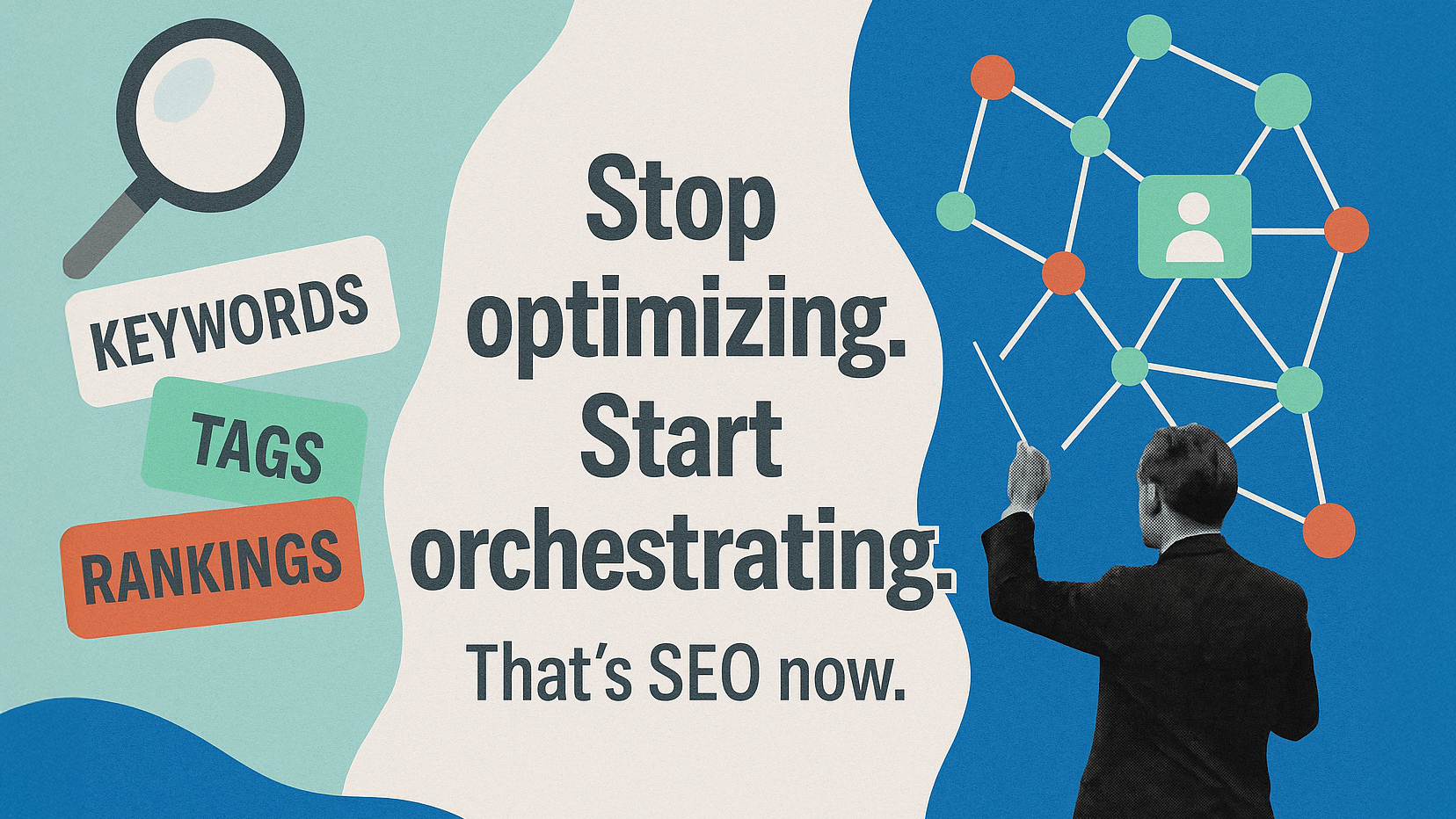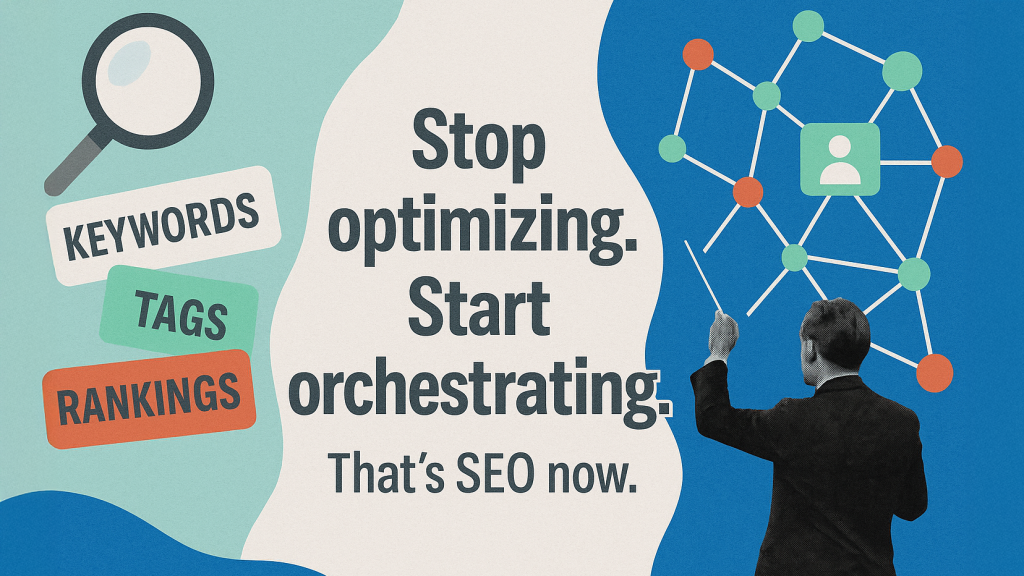Stop optimizing. Start orchestrating. That’s SEO now.

Headlines predicting another “AI winter” are beginning to emerge, and the numbers back the skepticism. MIT reports that while 80% of organizations have piloted GenAI and 40% report deployment, only 5% have reached scale, with seven of nine sectors showing no structural change. McKinsey finds the same disconnect: 36% of executives report no revenue impact, only 19% say revenues have grown more than 5%, and 87% admit growth is still years away. Adoption is everywhere, but impact is almost nowhere.
But those headlines and numbers miss what’s happening inside enterprises right now. SEO leaders are being tapped to guide GEO—generative engine optimization. Not because we’re AI experts. Not because we know how every large language model works. We don’t. Much of it is opaque. We’re being asked to lead because SEO has always been about empathy—and that empathy now demands more than ever.
SEO has never been just about keywords or rankings. At its core, it’s empathy on two fronts. Empathy for search engines: understanding that Google’s real goal has never been “quality content”—it’s maximizing queries and ad revenue. And empathy for users: removing friction so they can get what they want, even when the incentives of the platform weren’t aligned with theirs.
Now comes a third empathy. Not for machines—they want nothing. But for the growth-at-all-costs giants building them. Their incentives are clear: maximum adoption, maximum stickiness, maximum usage. And just like Google, they’ll happily sacrifice accuracy to get it.
Most SEO practitioners don’t want to admit this, but “just create good content” was always a lie. Google rewarded backlinks and its chosen favorites, nothing more. An algorithm built on patterns can’t tell garbage from great—and AI providers will be no different. Pretending otherwise is naïve.
Discover how you appear across LLMs like ChatGPT, Perplexity, and Google AI, and get AI-powered strategy recommendations.

Capitalize on shifting incentives
And this shift in incentives is already reshaping how teams inside the enterprise work together. Only weeks ago, PR blocked digital outreach requests from my team. But when I pitched a GEO pilot—using the same product descriptions across third-party sites to strengthen how generative engines interpret our offering—they were all in. That’s the difference: the same function that resisted collaboration suddenly leaned in when the frame moved from SEO to GEO.
And empathy doesn’t stop at visibility. When someone finally does land on our site, the question isn’t “did we optimize for a keyword?” but “did we optimize for the journey?” Do they see the right message, the right next step, delivered with minimal friction? We used to call this conversion rate optimization. Is it SEO? Honestly, I don’t even know what SEO is anymore. What I do know is that to drive enterprise value, we need to evolve. The job isn’t about defending a label—it’s about aligning with outcomes.
Speak the language of your (internal) audience
This isn’t abstract. Here’s how I’ve been orchestrating at Adobe. Instead of optimizing for marginal traffic gains, I work across teams to align what really matters:
- With Product Marketing, that means using visuals to show, not tell.
- With Comms and Client Success, pulling case studies that speak directly to buyer needs.
- With PR, enforcing consistency on third-party sites so GEO doesn’t fragment.
- With Account Executives, digging into account conversations—who the contacts are, what objections surface, what prospects actually want. And, just as importantly, why they chose us over competitors. That intelligence feeds straight back into content and positioning.
And this is only the content layer. The next frontier is data—curating our own ontology to unify how the enterprise describes itself, so every team—and every system—speaks the same language.
Create the clarity everyone is looking for
This is why enterprise teams are turning to us. Product, PR, Analytics, Compliance—they’re all looking for clarity now. And the uncomfortable truth is this: If we stay in our comfort zones, GEO will be claimed piecemeal by other functions. Product will optimize for features, PR will chase reputation, analytics will drown in dashboards—and the enterprise will end up with a patchwork of disconnected tactics.
SEO should be the one to drive GEO because empathy is our core skill. We’ve always balanced platform incentives with user needs, turning ambiguity into alignment. That’s exactly what GEO requires. Without that orchestration, enterprises risk noise instead of clarity, activity instead of outcomes.
Become the leader your team needs
SEO isn’t dead. But it is unrecognizable from what it used to be. And it demands leadership now. Leadership means admitting we don’t know everything about LLMs, but we know how to orchestrate the right people into the room and align them on outcomes.
Here’s the litmus test: If your reporting still begins and ends with traffic, rankings, or visibility dashboards, you’re already behind. The enterprise doesn’t need more proxies. It needs orchestration.
And maybe that’s the point. Whatever we call this discipline, it’s not about optimization anymore. It’s about using empathy to orchestrate clarity—across platforms, across teams, across journeys. That’s the mandate. And if SEO doesn’t own it, no one will. So I’ll ask you—is SEO dead, or is it finally something bigger?







Recent Comments